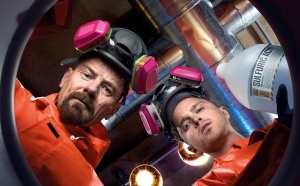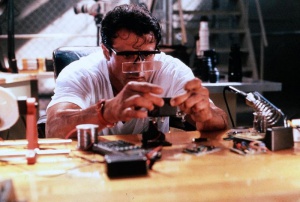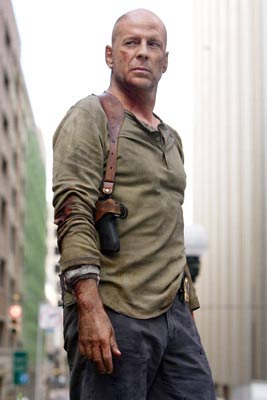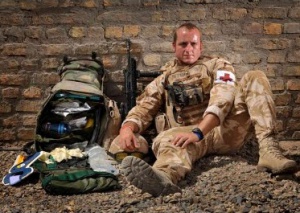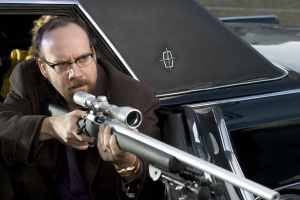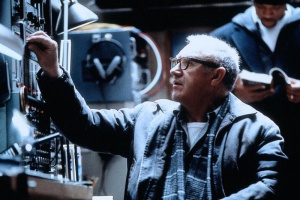Action Templates
Anders als bei einem "normalen" GURPS Spiel, müssen bei Action Charaktere nach Templates (230CP) erschaffen werden. Zu jedem Template gehört zusätzlich ein Lenses (20CP).
Hier findet Ihr eine Übersicht über alle wählbaren Templates und am Schluss die Lenses.
Assassin[Bearbeiten | Quelltext bearbeiten]
Das Template für den Assassin findet Ihr in A1:7.
Beschreibung[Bearbeiten | Quelltext bearbeiten]
You might be a hit man, a spy with a license to kill, or a sniper with a uniform and a serial number. Whatever your background, your specialty is quick, silent death. Where the demolition man (A1:8-9) might demolish a city block “just to be sure,” and the shooter (A1:14) would dive right in, guns blazing, you take pride in precision. On a squad, you’re the one the mooks don’t see, covering your allies from a stealthy perch.
Tipps zur Charaktererstellung[Bearbeiten | Quelltext bearbeiten]
A cinematic assassin is nearly always a deadly sniper – his major choices concern his modus operandi the rest of the time. To strike from afar, he’ll want several Guns skills, possibly Crossbow, Armoury (for expensive rifles), and Observation (for spotting). For close-range ambush, Garrote, Knife, and Fast-Draw are valuable – as are Acting and Disguise. Other “weapons” include speeding cars (Driving) and overdoses (Poisons).
Background skills are crucial, too:
- Criminal: For the mob hit man or faceless hireling, survival demands high levels of Intimidation, Savoir-Faire (Mafia), and Streetwise.
- Intelligence: A shadowy “wet work” specialist knows targets and locations (Area Knowledge and Current Affairs), and likely has a sideline in Interrogation. A flamboyant secret agent prefers classic “spy skills” – Cryptography, Intelligence Analysis, etc. Either might have unusual skills; e.g., Liquid Projector, for cyanide-spraying cigarette lighters.
- Law Enforcement: An ex-cop, out for revenge, or a particularly cold-blooded SWAT sniper. Either should know such standard police skills as Criminology, Law, and Savoir-Faire (Police).
- Military: This generally means a sniper, with keen Observation, training at stealthy insertion (Parachuting, Scuba, Skiing, etc.), and exceptional Tactics.
- Security: A sharpshooter wants as much Body Language and Tactics as he can afford. A “black bag” man who illegally eliminates suspected terrorists needs Criminology and Intelligence Analysis. Either should improve Observation.
Cleaner[Bearbeiten | Quelltext bearbeiten]
Das Template für den Cleaner findet Ihr in A1:7-8.
Beschreibung[Bearbeiten | Quelltext bearbeiten]
You make evidence – prints, casings, blood, bodies, and all – disappear. You might clean for the mob or tidy up behind ultra-black government operators, but what you do for the team is crucial: make it look like they weren’t there, and when that’s impossible, make sure that nobody can discover the truth. Some call the assassin (above) a “cleaner,” but your art isn’t killing. Of course, not every “corpse” is dead yet, and an eyewitness is the most damning evidence.
Tipps zur Charaktererstellung[Bearbeiten | Quelltext bearbeiten]
The cleaner decides how he eliminates evidence. Trucking it off and dumping it with associates requires Driving (Heavy Wheeled), Freight Handling, and Hazardous Materials, plus a Contact Group. A successful skill roll by the Contact Group means the goods are incinerated, dumped overboard, or otherwise truly gone. A cleaner might use Animal Handling to feed bodies to animals; Chemistry to dissolve organic matter in acid; Explosives (Fireworks) for convenient fires; Acting, Disguise, and Fast-Talk to pose as the coroner; Electronics Operation (Media) to doctor security videotapes; and/or Forgery to fake death certificates.
Other considerations:
- Criminal: A mob cleaner needs Streetwise for payoffs and Urban Survival to locate convenient Dumpsters and goalposts. Savoir-Faire (Mafia) is vital – the profession is built on connections.
- Intelligence: Spies often make live people vanish. Such “hostile extractions” demand Observation and Shadowing, usually followed by Brainwashing or Interrogation. Cover-ups are also common; learn Propaganda for that.
- Law Enforcement: A crooked cop makes a frighteningly efficient cleaner – he can operate even after the evidence is found! He uses Administration and Law (Police) to alter crime-scene reports, and Savoir-Faire (Police) to finagle access to the evidence locker.
- Military: Commandos might bring along someone specifically to hide their activities. Secondary skills like Explosives, Guns, and Knife are likely. Lens skills will be whatever the unit teaches all members.
- Security: Cinematic security agencies cover up illegal killings and kidnappings of enemies of the state with red tape – an abuse of Administration. Hazardous Materials specialties can dispose of WMD materials found during operations.
Demolition Man[Bearbeiten | Quelltext bearbeiten]
Das Template für den Demolition Man findet Ihr in A1:8-9.
Beschreibung[Bearbeiten | Quelltext bearbeiten]
Setting bombs is an excellent way to learn how to defuse them, while disarming them means thinking like a bomber. Thus, “demolition man” describes explosive ordnance disposal technicians, combat engineers, and mad bombers. All require a steady hand and familiarity with explosives, arson, and sabotage. The differences amount to “How crazy are you?” and “Who pays for your work?” If you belong to a team, you get the fun jobs of clearing booby traps ahead and leaving nasty surprises behind.
Tipps zur Charaktererstellung[Bearbeiten | Quelltext bearbeiten]
The big question is “Which Explosives specialty?” The answer depends heavily on background:
- Criminal: Crooks favor Explosives (Demolition). Bombers use secondary skills like Architecture and Mechanic to situate explosives effectively, and Smuggling to conceal them. Safecrackers need Lockpicking and Traps. Both benefit from Forced Entry, Filch, Holdout, and similar background skills.
- Intelligence: Spies use skills identical to those of criminal bomb-makers. Area Knowledge, Interrogation, Observation, and Research can locate suitable targets.
- Law Enforcement: Bomb-squad technicians need Explosives (EOD), Search, and Traps. Criminology is useful for outguessing bombers, while Expert Skill (Military Science) and Forensics can reveal where the explosives came from.
- Military: Soldiers might follow either path, acquiring Armoury, Artillery, and Guns (Grenade Launcher or LAW) along the way. Pooling secondary and background points can give formidable levels of Scuba and Swimming (for underwater demolition), Throwing (for grenades!), etc.
- Security: As law enforcement, but focused on antiterrorism. Dirty bombs and nerve gas demand Hazardous Materials skills.
Face Man[Bearbeiten | Quelltext bearbeiten]
Das Template für den Face Man findet Ihr in A1:9-10.
Beschreibung[Bearbeiten | Quelltext bearbeiten]
Every crew needs a “social engineer” – they just don’t know it yet! You’ll convince them, though, because that’s your gift. Whether it’s fast-talking the guards at the gate or setting up the long con, you’re a pro at getting close to the mark and into his confidence. Your biggest asset is a devious mind, but you also possess cat-like grace and disarming good looks. Your chief weakness is that even your closest associates can’t quite bring themselves to trust you.
Tipps zur Charaktererstellung[Bearbeiten | Quelltext bearbeiten]
Face men thrive in any social situation, but most have specialties: falsifying records (Administration, Counterfeiting, Electronics Operation, and Forgery), impersonation (Disguise, plus more Acting and Fast-Talk), living large (Connoisseur, Dancing, and Gambling), “psy-ops” (Interrogation, Propaganda, Psychology, and high Detect Lies), stolen goods (Smuggling and increased Merchant), theft (Filch, Pickpocket, Sleight of Hand, and Stealth), etc. Background puts a further spin on things:
- Criminal: A crook has background skill points in Carousing, Intimidation, Savoir-Faire (Mafia), and/or Streetwise – all of which benefit from Smooth Operator!
- Intelligence: Some spies use social manipulation to get near objectives; they’ll want Area Knowledge of exotic destinations, Photography (for miniaturized cameras), and Search (for rifling through handbags and discarded clothing). Others are psychological warriors with scary Brainwashing, Interrogation, and Propaganda skills.
- Law Enforcement: Undercover detectives and cinematic vice cops need Streetwise (which gets the Smooth Operator bonus), Accounting (for quick peeks at the books), and/or Criminology (to outthink the opposition).
- Military: Military face men are well-versed in Leadership, Savoir-Faire, and Tactics. Likeable officers also know Strategy, while well-connected NPCs improve Soldier skill.
- Security: Some agencies employ spokesmen to defuse diplomatic bombs; e.g., when a spy is deported. Most hail from the side of the company that teaches Administration and Intelligence Analysis.
Hacker[Bearbeiten | Quelltext bearbeiten]
Das Template für den Hacker findet Ihr in A1:10-11.
Beschreibung[Bearbeiten | Quelltext bearbeiten]
Banks and utilities, streetlights and air-traffic control, communications and security systems ... everything runs on computers. If you’re legit, your beat is huge and you face rivals halfway around the globe. If you aren’t, you’re betting your laptop against million-dollar opposition. On a team, you validate false ID for the face man (pp. 9-10), kill alarms ahead of the infiltrator (pp. 11-12), pull records for the investigator (pp. 12- 13), and work geek-to-geek with the wire rat (p. 16).
Tipps zur Charaktererstellung[Bearbeiten | Quelltext bearbeiten]
Cinematic hackers have a specialized skill set, but there’s still some flexibility. Those in grittier stories use “realistic” techniques: faking ID in order to gain physical access to the mainframe (Forgery), Dumpster-diving for passwords on Post-it notes (Scrounging), poring over manuals (Speed-Reading), etc. In more fanciful movies, they do tricks like create fancy 3D maps of the objective (Cartography), reprogram security systems (Electronics Operation (Security)), and turn traffic-monitoring systems into spy-cams (Electronics Operation (Surveillance)). Variations include:
- Criminal: This is most hackers! Even the lovable kid – that’s what Social Stigma (Minor) and Bicycling are for – might have Streetwise, Gambling (to win at online poker), and Urban Survival (to locate Dumpsters for diving).
- Intelligence: High-tech spies generally crank up Cryptography, Intelligence Analysis, and Research. Those that spread disinformation often know Propaganda, too.
- Law Enforcement: Realistic computer-crimes investigators mostly aren’t hackers, but those in the movies are frequently “reformed” criminals. These routinely ignore physical police skills in favor of Administration, Accounting, and similar cerebral stuff.
- Military: Cinematic elite units often include a skinny guy with a rifle and an olive-drab laptop. Everybody else has to bleed and die to get him to some secure objective. His best military skills are more likely to be Forward Observer and Strategy than Guns and Hiking.
- Security: An expert in computer security is as likely as one in physical security. Most of the notes for law enforcers apply, but use background skill points to buy even higher levels of Cryptography – and likely Criminology, for computer-assisted profiling.
Infiltrator[Bearbeiten | Quelltext bearbeiten]
Das Template für den Infiltrator findet Ihr in A1:11-12.
Beschreibung[Bearbeiten | Quelltext bearbeiten]
You’re adept at getting into places that nobody else can get into and taking things that everybody else wants – preferably sans explosions and gunshots. If all goes well, the first person to discover your handiwork is the ambassador who can’t find his briefcase the next morning, or the watchman who realizes the Rembrandt is gone after it’s hanging in your condo by Central Park. When working with a crew, your priority is to go in ahead and open the door.
Tipps zur Charaktererstellung[Bearbeiten | Quelltext bearbeiten]
Secondary and background skill choices here vary greatly by motivation:
- Criminal: Cat burglars steal to get rich before they’re too old for tight black catsuits. Most possess commonly taught secondary skills: Driving, Holdout, Running, Search, etc. Background points buy more Forced Entry and Stealth, plus enough Savoir-Faire (Mafia) and Streetwise to score tools and move loot.
- Intelligence: Agents who photograph missiles and steal plans learn “technical” secondary skills – Cartography, Piloting, Scuba, Submarine, etc. The background skills Observation, Photography, and Search are crucial for intelligence-gathering.
- Law Enforcement: Some cinematic cops-turned-PIs employ illegal entry as their chief investigative technique. Likely secondary skills are Animal Handling, Driving, Filch, and Search. Fitting background skills include Criminology and a respectable level of Guns.
- Military: Because commandos frequently infiltrate hot zones, they should pool secondary and background points to buy high levels of Camouflage, Parachuting, Scuba, and Swimming, plus more and better combat skills.
- Security: The classic infiltrator role here is the secret policeman who finds or plants evidence where needed. Secondary points go toward Holdout, higher Forced Entry and Stealth, and unarmed skills. Background skills always include Criminology and combat training.
Investigator[Bearbeiten | Quelltext bearbeiten]
Das Template für den Investigator findet Ihr in A1:12-13.
Beschreibung[Bearbeiten | Quelltext bearbeiten]
It’s crucial to know where you’re headed, when the opposition intends to move, what you (or they) are grabbing, who you’re shooting at, and why. Hitting the wrong mark can be embarrassing – or fatal. You might not be as slick as the face man (pp. 9-10), a computer wizard like the hacker (pp. 10-11), or the equal of the wire rat (p. 16) at surveillance, but you still get the facts, and can coordinate these experts and analyze their results.
Tipps zur Charaktererstellung[Bearbeiten | Quelltext bearbeiten]
Investigators have significant latitude in primary skills. Their many strategies include document searches (Research and Speed-Reading), physical searches (Criminology and Search), pursuit (Shadowing and Tracking), “reading” people (Body Language and Lip Reading), shakedowns (Detect Lies and Interrogation), and surveillance (Electronics Operation, Observation, and Photography) – pick a few favorites. Secondary skills cover everything from checking the news (Current Affairs) and the ’net (Computer Operation) to forensic accounting (Accounting), lab analysis (Forensics), and other exotica.
- Criminal: Every crew needs someone to case objectives – typically via surveillance – and formulate plans. Major background skills are Streetwise (for “word on the street”), plus Filch, Forced Entry, and Stealth for testing security, grabbing keys, etc.
- Intelligence: Like real spies, cinematic ones often utilize dogged research and tedious surveillance. Background training consists of many Area Knowledge and Current Affairs specialties, plus additional points plowed into primary and secondary areas.
- Law Enforcement: The detective (private or police) might use any strategy! A decent Law (Police) skill is crucial to ensure evidence is admissible in court. Combat skills are vital when hunting dangerous crooks.
- Military: Intelligence officers interrogate prisoners (Interrogation) and search enemy positions (Search). Lens skills are whatever the unit teaches all members.
- Security: Counterspies use every means to locate spies. Background points should boost primary and secondary choices and buy the combat skills that every cinematic agent needs.
Medic[Bearbeiten | Quelltext bearbeiten]
Das Template für den Medic findet Ihr in A1:13-14.
Beschreibung[Bearbeiten | Quelltext bearbeiten]
Firefights, explosions, and car crashes mean injuries – and when the hurt comes down, you’re ready with the dressings and defibrillator paddles. You might be a military field medic, an urban EMT, a first-rate physician, or a third-rate vet who stitches up mobsters for cash. Whatever your credentials, you find uses for your medical expertise even when nobody has been shot: captives need drugging, allies need antidotes, and an action hero’s world is full of scorpion stings, snakebites, and terrorist bioweapons.
Tipps zur Charaktererstellung[Bearbeiten | Quelltext bearbeiten]
Extreme Physician skill is necessary to simulate actionmovie realism. With decent gear (+1 or +2 to skill), the medic can accept the -10 for instant use described in Time Spent (p.B346) and thus patch people up during a gunfight! This suggests a talented professional; however, actionheroes are rarely bookish researchers. A better archetype is the bush doctor (Knife, Naturalist, Piloting, and Scrounging): adept at working whatever’s at hand and treating venomous bites. Another is the cinematic epidemiologist (Expert Skill (Epidemiology), Hazardous Materials, Interrogation, and NBC Suit), who enters hot zones, identifies plagues, and confronts the miscreants who unleashed them. Background is equally important:
- Criminal: A violent crew might include a back-alley doc. Good Filch and Streetwise let him steal or buy equipment – and other skills may suggest how he lost his license (Carousing or Gambling).
- Intelligence: The hands that heal can also torture and administer truth serums. Lens skills of importance are Brainwashing, Interrogation, and improved Psychology.
- Law Enforcement: Many an action-hero EMT is functionally a cop and a doctor. Crucial training includes combat skills – and often a remarkable level of Forensics.
- Military: In military games, PC survival depends on somebody with Surgery being right there to stabilize mortal wounds. Corpsmen have their unit’s usual background skills – especially combat skills.
- Security: The notes for the intelligence lens apply. Medics are also assets on a team of bodyguards, where they’ll need Body Language, Observation, and combat skills.
Shooter[Bearbeiten | Quelltext bearbeiten]
Das Template für den Shooter findet Ihr in A1:14.
Beschreibung[Bearbeiten | Quelltext bearbeiten]
It wouldn’t be an action story if the floor wasn’t covered with spent brass eventually – and while the entire squad shoots when the chips are down, you’re a true gunslinger. You’ll tackle a whole building full of mooks, need be ... you’re that good. The assassin (p. 7) scores higher with the sniper rifle and the demolition man (pp. 8-9) does better with explosive weaponry, but you’re not choosy. If it shoots, you can and will use it.
Tipps zur Charaktererstellung[Bearbeiten | Quelltext bearbeiten]
Choose your weapons! First, select a primary Guns skill. Options are Pistol, Shotgun, and SMG because most action games visit the city, where heavier firepower slaughters more bystanders than bad guys. The GM might permit Guns (Rifle) if there’s no assassin to upstage, or Guns (LMG) in a military game. Background affects remaining choices:
- Criminal: Gangsters favor common, easily replaced weapons. Top skills are Guns (Pistol, Rifle, Shotgun, and SMG), Fast-Draw, and Liquid Projector (Sprayer) for pepper spray. Archetypal background skills are Brawling and Intimidation.
- Intelligence: Most trigger-happy “spies” are ex-military muscle. They’re encouraged to favor weapons that can be concealed and/or silenced, wielded with Guns (Pistol, Rifle, and SMG), Fast-Draw, and occasionally Crossbow or Liquid Projector. Lens skills such as Smuggling and Holdout help hide hardware, and Area Knowledge often explains why a gunman was retained.
- Law Enforcement: A SWAT man. He’ll want Guns (Pistol, Rifle, Shotgun, and SMG), Guns (Grenade Launcher), and Throwing. Instead of using background points for more combat skills, buy decent levels of Observation and Tactics.
- Military: Every soldier shoots, but the “heavy weapons man” knows some of Guns (Grenade Launcher, LAW, and LMG), Gunner (Cannon and Machine Gun), and Liquid Projector (Flamethrower). In the movies, he’s deadly with Knife and Spear (bayonets), trained at Tactics, and familiar with really heavy weapons – Artillery.
- Security: Bodyguards lean toward concealable firepower – Guns (Pistol, Shotgun, and SMG), Fast-Draw, and Liquid Projector (Sprayer). Choice lens skills are Body Language (“Gun!”), First Aid, Holdout and Observation.
Wheel Man[Bearbeiten | Quelltext bearbeiten]
Das Template für den Wheel Man findet Ihr in A1:14-15.
Beschreibung[Bearbeiten | Quelltext bearbeiten]
As E.B. White said, “Everything in life is somewhere else, and you get there in a car.” Sometimes you get there in a van, a chopper, or a rigid inflatable boat, but that maxim is a golden rule for action heroes. Whether you’re a lone transporter who moves high-value cargoes for a fee, or a chauffeur for gangsters, soldiers, or dignitaries, your stock in trade is the ride. You customize the vehicle, choose the routes, and sit behind the controls.
Tipps zur Charaktererstellung[Bearbeiten | Quelltext bearbeiten]
Wheel men have many choices. Most want Driving and Mechanic – but some stories feature teams that travel by boat or plane, or vehicles fitted with fancy gadgets. Further considerations:
- Criminal: Getaway drivers and “transporters” learn Driving,Freight Handling, and Navigation (Land); use personal weapons; and master Area Knowledge and Smuggling. Their top background skill is Urban Survival – to know where not to drive!
- Intelligence: Spies occasionally need exotica like Submarine and Piloting (Glider), but mostly Driving. They’re adept at Electronics Operation, and know Artillery and Gunner for spycar weapons! Pooling secondary and background points allows superior Shadowing and Smuggling.
- Law Enforcement: Cops favor Driving specialties for the department’s motorcycles, cars, and vans, and/or Piloting for the chopper. Area Knowledge, Electronics Operation (Communications), and Shadowing are useful. Background points buy Observation (for stakeouts) and raise Guns to levels suitable for high-speed battles.
- Military: Anything’s possible, but helicopter pilots enjoy a special place in action movies. Artillery, Electronics Operation, and Gunner– and Parachuting, for pilots – are common. Popular lens skills are Seamanship or Submariner to crew big vehicles, and Camouflage for when the squad disembarks to continue on foot.
- Security: Most bodyguard teams include a chauffeur with Driving, Mechanic for reviving shot-up rides, and Area Knowledge and Navigation (Land) to pick routes. Savoir-Faire (Servant) and First Aid may be mandatory.
Wire Rat[Bearbeiten | Quelltext bearbeiten]
Das Template für den Wire Rat findet Ihr in A1:16.
Beschreibung[Bearbeiten | Quelltext bearbeiten]
You’re the crew’s ears and eyes. Cameras, mikes, tracking beacons, wiretaps, lasers bounced off windows, optical fibers under doors . . . no act of electronic privacy invasion is too small. Small is good, actually, because it’s harder to see. When there’s nothing on CCTV, you entertain yourself rigging remote detonators for the demolition man (pp. 8-9), running cable for the hacker (pp. 10-11), and cutting power for the infiltrator (pp. 11-12). You’re truly a hotshot with the soldering gun.
Tipps zur Charaktererstellung[Bearbeiten | Quelltext bearbeiten]
Customizing a wire rat means choosing primary specialties and secondary skills that complement some forte. For instance, a surveillance man boosts Surveillance specialties, learns Media specialties for tweaking recordings, and supplements this with Camouflage and Smuggling for concealing bugs, Photography for cameras, and Body Language, Lip Reading, and Observation to understand what he’s seeing. The cinematic geek, however, adds Media and Sensors specialties to primary skills, and learns Fast-Draw and Holdout for gizmos, Scrounging for finding parts, and Traps for digital surprises. Likely background options:
- Criminal: An expert at cutting power and defeating alarms requires Electrician skill and Security specialties at high levels to work quickly, plus physical lens skills: Filch, Forced Entry, Stealth, etc.
- Intelligence: Spies are frequently surveillance experts. Combiningsecondary and background points allows high levels of Holdout (for “wiring” people) and Smuggling (for concealing vehicular tracking beacons). Shadowing – for prowling around in the surveillance van – is common.
- Law Enforcement: Wiretap experts resemble spies, but SWAT teams also deploy wire rats in the field to scout criminal hideouts before raids. This activity calls for Stealth, and for background skills like Guns and Tactics.
- Military: The squad “comms” expert has Communications specialties for radios, plus Sensors specialties for thermograph and radar. Background points go into effective Guns skills – and Forward Observer turns a radio into a deadly weapon.
- Security: The intelligence and law enforcement notes apply, but security agents often specialize in countersurveillance, and train Search to high levels for finding bugs.
Lenses[Bearbeiten | Quelltext bearbeiten]
Criminal[Bearbeiten | Quelltext bearbeiten]
You’re a criminal or an ex-criminal. This lens is for a crook who’s a believable hero, even if he isn’t nice; e.g., a hacker, a casino robber, or even a principled hit man. Psycho killers and terrorists rarely make good heroes.
Intelligence[Bearbeiten | Quelltext bearbeiten]
You’re an active or retired spy, or a “sleeper.” Not all spies work for governments. In the movies, corporate spooks are common, and nongovernmental organizations – notably the U.N. – have secret agencies.
Law Enforcement[Bearbeiten | Quelltext bearbeiten]
You’re a cop (detective, marshal, etc.), retired cop, or private investigator. The latter two have no official clout, but several templates offer useful Contact Groups.
Military[Bearbeiten | Quelltext bearbeiten]
You have experience as a guerrilla, militiaman, reservist, regular soldier, or special operator. This need not reflect your current status, which is often “mercenary” in the movies.
Security[Bearbeiten | Quelltext bearbeiten]
You’re a professional counterspy (if so, this background is to “intelligence” as “law enforcement” is to “criminal”), bodyguard, or secret policeman.

